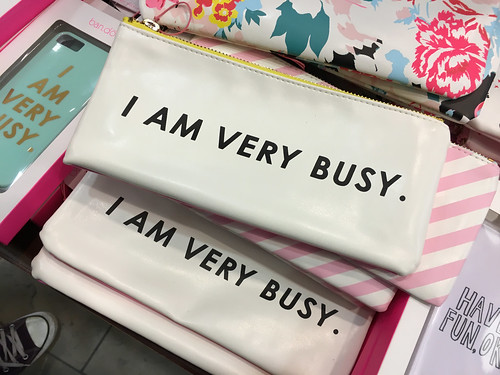Just as work and rest are partners (as I argue in REST), so too are busyness and laziness actually linked in ways we don’t always recognize. Writer Abigail Murrish discovered this when she gave up saying “I’m busy” for Lent:
for Lent this year, I gave up saying, “I’m busy.” The lessons I learned surprised me….
After a stressful fall and winter, I had fallen into a bad habit of proclaiming my busyness whenever friends and family asked me how I was. My response was starting to bother me. I realized “busyness” had become part of my identity.
What did she discover?
Busyness is often a form of laziness. It’s a way to feel productive and active, without having to think much about what you’re doing, or whether you’re doing the right things. When you have an abundance of things you could be doing, and micro-tasks that can soak up every minute of your day, you need never lack for busyness- and never stop to question whether you’re doing the right thing. As Murrish writes:
Early this year, I read Still: Notes on a Mid-Faith Crisis by Lauren Winner. In it, Winner recounts how her full schedule actually kept her from doing more worthwhile things in life. She writes:
“Busyness as often as laziness supplies my excuse: I am too busy to go to church, too busy to pray; there’s not enough time to pray, not enough time to hold body together, let alone soul. I am too lazy to do what’s important, or hard, so I stay busy with everything else.”…
Busyness is not a measure of our value, productivity, significance, or importance as human beings.
There’s more time in the week than you think. A certain amount of our busyness comes from a combination of poor (or poorly thought-out) time management, and the exhaustion that comes from having to contemplate an endless number of options about how to spend our time. Murrish writes:
As I cut “I’m busy” from my conversations, I noticed a shift in my thinking. I started operating out of a sense of abundance with my time versus scarcity. I looked at my schedule differently, and I realized I wasn’t as busy as I thought I was. Rather, I was a poor steward of my time…. I realized that I feel busy all the time because I lack the routines to keep me grounded in my daily work and home life.
Time, not being busy, is what’s valuable. “Busyness is not a measure of our value, productivity, significance, or importance as human beings.” After giving up busyness, Murrish writes, “I’m learning not to measure my success by the degree of my busyness but by how intentionally I fill my days.”


